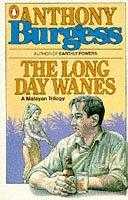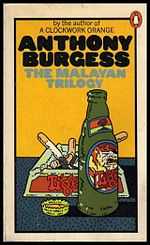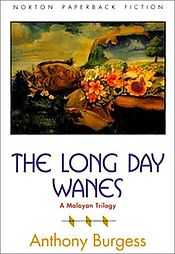The Long Day Wanes
|
1993 W.W. Norton edition | |
| Author | Anthony Burgess |
|---|---|
| Country | United Kingdom |
| Language | English |
| Genre | Colonial novel |
| Publisher | Heinemann |
| Published | 1956 to 1959 |
| Media type | Print (hardback & paperback) |


The Long Day Wanes: A Malayan Trilogy, also published as The Malayan Trilogy, is Anthony Burgess's novel cycle about the withdrawal from empire.
It is a detailed fictional exploration of the effects of the Malayan Emergency and of Britain's final pull-out from its Southeast Asian territories. The title is taken from Alfred, Lord Tennyson's Ulysses: "The lights begin to twinkle from the rocks: / The long day wanes: the slow moon climbs: the deep / Moans round with many voices. Come, my friends, / 'Tis not too late to seek a newer world. / Push off, and sitting well in order smite / The sounding furrows; for my purpose holds / To sail beyond the sunset, and the baths / Of all the western stars, until I die."
The three volumes are:
- Time for a Tiger (1956)
- The Enemy in the Blanket (1958)
- Beds in the East (1959)
With the trilogy, his first published venture into the art of fiction, Burgess staked a claim to have written the definitive Malayan novel (i.e., novel of expatriate colonial experience of Malaya) to set alongside Orwell's novel (Burmese Days), Forster's on India (A Passage to India) and Greene's on Vietnam (The Quiet American).
As the writer of the trilogy, Burgess was perhaps the last major representative of a tradition of colonial literature going back to Kipling on India and, on Southeast Asia in general, Conrad and Maugham.
It was Burgess's ambition to become "the true fictional expert on Malaya." He wrote in the introduction to an early paperback edition: "My story is about the races of Malaya, as exemplified in characters who have, or had, counterparts in real life."
Unlike Conrad, Maugham and Greene, who made no effort to learn local languages, but like Orwell (who had a good command of Urdu and Burmese) and Kipling (who spoke Hindi), Burgess had excellent spoken and written Malay. He put this to good use in learning about the peoples of the peninsula as people rather than as mere servants or remote subjects. He investigated indigenous concerns and sought to produce a rounded, authentic picture of Southeast Asian life. The corruption of the Southeast Asians and of the Europeans is exposed comically but without mercy.
Although the works have few similarities, Burgess paid tribute to Henri Fauconnier, author of the 1930 novel Malaisie (published in English as The Soul of Malaya). He was no doubt thinking of himself as much as of Fauconnier when he wrote: "Perhaps the best of all Malayan fiction is, strangely, by a Frenchman – Malaisie, by Henri Fauconnier, a Prix Goncourt winner of the twenties. Its strength lies in its author's knowledge of the Malays, which naturally entails a knowledge of the Malay language."
The trilogy tracks the fortunes of the history teacher Victor Crabbe, his professional difficulties, his marriage problems, and his attempt to do his duty in the war against the insurgents. For plot details, see the pages on the component titles Time for a Tiger, The Enemy in the Blanket and Beds in the East.
Availability in Malaysia
Copies of this book, new and used, can be found in book stores in Kuala Lumpur and Penang. As of May 2010, a major bookstore in Kuala Lumpur appears to have copies of this book (both US and UK editions) on sale via its website. The books, collected together as The Malayan Trilogy, are available at times at the Borders in Berjaya Times Square, The Times chain of bookstores, and Kinokuniya at the Suria KLCC. In addition, a couple of the individual book stalls in the Chowrasta Bazaar in Georgetown, Penang, have new or second-hand copies of the Vintage edition of the trilogy, ranging from RM30 to RM50, as does Sam's (second-hand only) of Lebuh Chulia in the same city. Popular Bookshop, in Penang and KL, does not seem to carry the trilogy.
The Sun newspaper reported on 5 December 2006 that the country's internal security ministry was barring books deemed "offensive" to Malaysian society. A number of titles were being denied entry by road at Johor Baru, among them Burgess's Malayan Trilogy.
The secretary of the publications and Quranic texts control division at the ministry, Che Din Yusoh, was reported as saying that the minister enjoyed "absolute discretion" to gazette "undesirable publications," i.e., those banned under the Printing Presses and Publications Act, section 7.
Further reading
- Zawiah Yahya. Resisting Colonialist Discourse. Bangi: Penerbit Universiti Kebangsaan Malaysia, 1994. ISBN 978-9679422962.
- Douglas Kerr. "Anarchy in the East: Burgess and the Malayan Trilogy." In Chapter 8, "Figures of Rule", of Kerr, Eastern Figures: Orient and Empire in British Writing. Hong Kong: Hong Kong University Press, 2008. Pages 191–96. ISBN 978-9622099340.
- Lee Erwin. "Britain's Small Wars: Domesticating 'Emergency.'" In Edinburgh Companion to Twentieth-Century British and American War Literature, edited by Adam Piette and Mark Rawlinson. Edinburgh: Edinburgh University Press, 2012. Pages 81–89. ISBN 978-0748638741.
Trivia
- It should be noted that the Penguin, Minerva and Vintage editions of the one-volume trilogy share the same ISBN. The Vintage edition (published 2000) is the only of these three known to have the introduction by Burgess.
| ||||||||||||||||||||||||||||||||||
